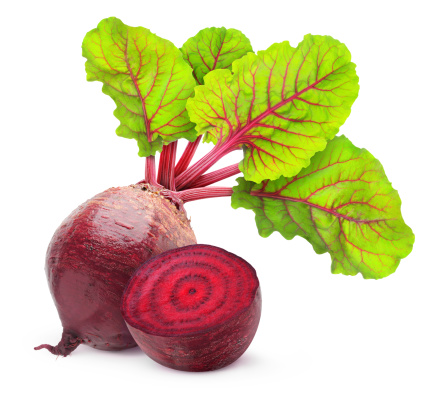
Beets, a root vegetable (but a member of the tuber family), have a few really unique and desirable nutritional qualities which set it apart from other root vegetables.
The bright colors of beets are attributed to their unique pigmentation. These pigments give them a unique nutritional edge over most other tubers. The consumption of beets, either the tuber or its top greens, is an excellent way to acquire a source of valuable antioxidants in your diet.
The consumption of beet root and greens is linked to better glucose control, decreased blood pressure, and anti-cancer activity. Previous research has found that beet root extract can help suppress cancer cell growth in animals. In a study evaluating the effect of beet root extract on prostate and breast cancer cells, the researchers compared the effects of the beet extract with a chemotherapy drug commonly used in cancer treatment. The results indicated that although the drug was more effective at cancer cell suppression, the beet root extract continued to show favorable results.
Like its close cousin Swiss chard, beet greens are great source of flavonoids which have been previously shown to lower inflammation, cholesterol and keep blood from clotting excessively.
Beets are also good sources of folic acid, B vitamins, vitamin A, vitamin C, carotenoids, and some essential minerals, including potassium, calcium, copper, and iron.
How to Eat Beets the Right Way
Add beets to your salad, along with any other green, leafy vegetables such as spinach, kale or Swiss chard. You can also use cooked beets in traditional borscht.
Authentic beet borscht is delicious and an extremely nutritious type of food to eat in the winter months because of its hardy nutritional and medicinal benefits. Beets can also be gently steamed and served with your favorite entrée. In my opinion, the best type of beet to consume is pickled beets. I love these as a summer treat, as part of a salad or a side dish.
If you find your urine turning a pink color after you consume beets, you don’t need to worry. A small proportion of people are not able to completely break down some of the pigments contained in beets. Although it may surprise you, it’s completely harmless.
Sources:
Ninfali, P., et al., “Nutritional and functional potential of Beta vulgaris cicla and rubra,” Fitoterapia. June 7, 2013.
Kapadia, G.J., et al., “Cytotoxic effect of the red beetroot (Beta vulgaris L.) extract compared to doxorubicin (Adriamycin) in the human prostate (PC-3) and breast (MCF-7) cancer cell lines,” Anticancer Agents Med Chem. March 2011; 11(3): 280-4.
“Beets nutrition facts,” Nutrition and you web site; http://www.nutrition-and-you.com/beets.html, last accessed June 25, 2013.













